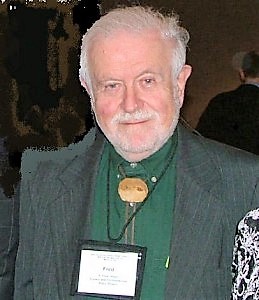
Siegfried Fred Singer (born September 27, 1924) is an Austrian-born American physicist and emeritus professor of environmental science at the University of Virginia. Singer trained as an atmospheric physicist and is known for his work in space research, atmospheric pollution, rocket and satellite technology, his questioning of the link between UV-B and melanoma rates, and that between CFCs and stratospheric ozone loss, his public denial of the health risks of passive smoking, and as an outspoken critic of global warming. He is the author or editor of several books including Global Effects of Environmental Pollution (1970), The Ocean in Human Affairs (1989), Global Climate Change (1989), The Greenhouse Debate Continued (1992), and Hot Talk, Cold Science (1997). He has also co-authored Unstoppable Global Warming: Every 1,500 Years (2007) with Dennis Avery, and Climate Change Reconsidered (2009) with Craig Idso.
Singer has had a varied career, serving in the armed forces, government, and academia. He designed mines for the U.S. Navy during World War II, before obtaining his Ph.D. in physics from Princeton University in 1948 and working as a scientific liaison officer in the U.S. Embassy in London. He became a leading figure in early space research, was involved in the development of earth observation satellites, and in 1962 established the National Weather Bureau's Satellite Service Center. He was the founding dean of the University of Miami School of Environmental and Planetary Sciences in 1964, and held several government positions, including deputy assistant administrator for the Environmental Protection Agency, and chief scientist for the Department of Transportation. He held a professorship with the University of Virginia from 1971 until 1994, and with George Mason University until 2000.
Singer has been an advocate of the skeptical stance in the global warming controversy for a number of years. In 1990 he founded the Science & Environmental Policy Project to advocate this position. Singer argues there is no evidence that global warming is attributable to human-caused increases in atmospheric carbon dioxide, and that humanity would benefit if temperatures do rise. He is an opponent of the Kyoto Protocol, and has said of the climate models that scientists use to project future trends that
"models are very nice, but they are not reality and they are not evidence."